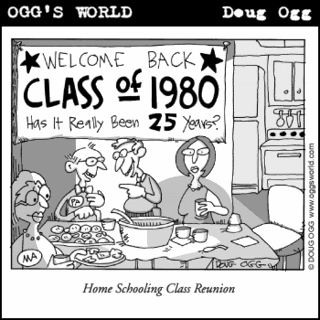As a former public school teacher I have, as you might readily surmise, an opinion about the home-schooling movement. Surprisingly, I am, at least in theory, very much in favor of it, though home schooling isn’t well-suited for every student. It also has to be determined whether the parental decision to home-school is based on realities of the child’s educational needs or merely upon a religiously-based schizophrenia or racism turned anti-government paranoia. There is home-schooling that is borne out of concern for the child and his or her specific needs and another that is the product of isolationism and separatism.
It is ironic that a society which demands that the parents, on one hand, take full responsibility for their child’s welfare, education, and behavior and then, conversely, continue to harshly criticize those home-schooling parents that actually accept that weighty task willingly! I cannot tell you how many times I heard people say “Education is the parent’s responsibility.” A parent that home-schools takes on a huge responsibility and a great risk that their efforts might fall short. However, would the home-schooled kid be at any less peril than a child left vulnerable to the free-for-all of public and parochial systems? There are some children who will thrive in home education setting and encounter greater risks by the public setting. I believe that option should be available with, of course, strict guidelines that conform to accepted academic standards.
The most common critique of home schooling centers around the socialization of the home-schooled child, wrongly assuming that being stuffed into a classroom with 30-40 other children, subjected to endless and various peer pressures, cliques or perpetual teasing, or forced into a collective schedule is somehow a healthy start to life and preparation for the future. Sure, many of us developed a thicker skin and learned to ‘roll with the punches’, but not all kids are that resilient. Some, whom you may know personally, retain those deep, silent scars of childhood taunts borne in an anarchic social atmosphere with no escape or adequate release. Such emotional scars adversely affect learning and later socialization much more profoundly than would being coached in iambic pentameter by your own mother.
These same critics are under the false impression that home-schooled children social captives confined to their rooms and seldom, if ever, venture out for extra-familial contact. It is likely there are, in fact, some very over-protective parents who, with perhaps the best of intentions, hide their children from the world, but most home-schoolers are not of that variety. Home-schooling families take part in group functions that include other home schooled children in addition, to the normal family functions and parties that we all must endure from time to time. To assume that a home-schooled kid will inevitably become a maladjusted social illiterate is just plain wrong. One would make an equally grave error in asserting that a publicly schooled child, by virtue of his education being ‘public’ must, therefore, be socially well-adjusted. Lest we forget, the ‘Columbine killers’ were products of our public schools.
I don’t know if home schooling is overall better or worse than the parochial or public alternatives. Some kids do better, and some do worse. Einstein, for example, did not thrive in the German public schools of his day and did not achieve his own greatness and potential until he was free of its rigid, institutional restraints. I feel the various systems can overlap and enhance each other when needed. In order to make some useful order out of it, we have to begin with a discussion free from hyperbole and misunderstanding. There is a way to provide options that work for everyone.


2 comments:
its a given the best info...
nazlin
ankitha
priya services
its a given the best info...
nazlin
ankitha
priya services
Post a Comment